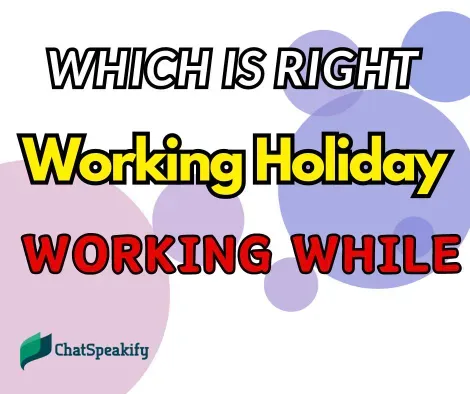Introduction: Two Pathways to Explore the World
Imagine yourself working in a vineyard in France, enjoying the local culture, or juggling a part-time job and classes in bustling Tokyo. Both working holidays and working while studying abroad offer unique opportunities to live and work in a foreign country, but they cater to different goals and lifestyles. Let’s explore the differences between these two options to help you decide which suits you best.
What is a Working Holiday?
Definition and Purpose
A working holiday is a program that allows young people to travel and work in a foreign country for an extended period, usually up to a year. The primary aim is cultural exchange and the opportunity to experience life in a different country.
- Example: John, a recent graduate, spent a year in Australia on a working holiday visa, picking fruit on farms and traveling across the country.
Benefits
-
Flexibility: You can take on various short-term jobs, which allows you to explore different regions and experiences.
-
Cultural Immersion: Living and working in different environments helps you deeply understand the local culture.
-
Travel Opportunities: With the flexibility of a working holiday, you can travel extensively within the host country.
Challenges
-
Job Security: Jobs are often temporary and may not provide stable income.
-
Limited Professional Growth: The work available may not align with your career goals or provide significant professional development.
What is Working While Studying Abroad?
Definition and Purpose
Working while studying abroad involves enrolling in a full-time academic program at a foreign institution and taking on part-time work to support your studies. This approach combines academic advancement with practical work experience.
- Example: Maria, an engineering student, studied at a university in Germany and worked part-time at a local tech startup to gain relevant industry experience.
Benefits
-
Academic Progress: You continue your education while experiencing a new culture.
-
Career Development: Part-time work in your field of study can provide valuable experience and networking opportunities.
-
Structured Environment: Universities often provide support services for international students, helping you balance work and study.
Challenges
-
Time Management: Balancing academic responsibilities with work can be challenging.
-
Work Restrictions: There are often limits on the number of hours you can work while holding a student visa.
Comparing the Two Options
Goals and Objectives
-
Working Holiday: Ideal for those seeking adventure, cultural immersion, and diverse job experiences. It’s a good fit for a gap year or post-graduation exploration.
-
Working While Studying Abroad: Suited for students focused on academic and career advancement who want to gain international experience in their field of study.
Financial Considerations
-
Working Holiday: You might earn enough to cover your living expenses, but savings are necessary for initial costs and travel.
-
Working While Studying Abroad: Part-time work can help with living expenses, but tuition and academic fees must be accounted for. Scholarships and financial aid might be available.
Lifestyle and Experience
-
Working Holiday: Offers a more flexible and travel-oriented lifestyle, allowing you to explore different parts of the host country.
-
Working While Studying Abroad: Provides a more structured routine centered around academic commitments, with the opportunity to build a stable life in one location.
Real-Life Examples
Working Holiday: Anna’s Adventure
Anna took a working holiday in New Zealand, where she worked at a hostel, volunteered at an eco-farm, and traveled across the stunning landscapes. This experience broadened her horizons and gave her a deep appreciation for Kiwi culture.
Working While Studying Abroad: Leo’s Journey
Leo pursued a master’s degree in business administration in Canada. He worked part-time at a marketing firm, which complemented his studies and helped him secure a full-time job after graduation. This combination of work and study prepared him for his future career.
Conclusion: Choosing the Right Path
Both working vacations and working while studying abroad provide valuable experiences, but the best option depends on your personal and professional objectives. If you want to experience adventure and culture without the weight of scholastic obligations, a working holiday may be the way to go. However, if you want to enhance your education and profession while living abroad, working while studying is a great alternative.
Consider your goals, financial situation, and preferred lifestyle to make the best decision. Whichever path you choose, you’re sure to gain invaluable experiences and memories that will last a lifetime.
References
-
Institute of International Education. (2020). Open Doors Report.
-
Australian Government Department of Home Affairs. (2021). Work and Holiday visa (subclass 462).
-
UK Council for International Student Affairs. (2021). Working during your studies.
